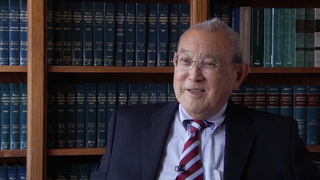Interviews
Necessary apologies (Spanish)
(Spanish) Now that the word reparation is trendy, the word repair must come from centuries ago, and in this group of people is where the Japanese community is, right? It is too unfair, too outrageous what happened. If you believe Pearl Harbor was the day that will live in infamy, the history of Japanese in Peru is the story of the infamous. As I wrote one day in “Discover Nikkei”, the most painful thing is not that their properties were confiscated or that were taken to concentration camps. The most painful thing was that they woke up one day and they didn’t have a homeland: they didn’t have a past: they found nothing. And this is cruel. There is no right to do this to anyone. No one has the right to take the spiritual land in your life. Therefore, they ought to receive an apology that hasn’t been given yet. North American has done this with the Japanese community in the United States. Why hasn’t Peru done it? But to ask that is to ask too much of Peru. The day this happens is because first… Also, there is a big line to wait on. We are on the ticket to ask for reparation or apologies. We are on the part, almost the last of the line, because the natives have to ask first. Then come the people from the jungle, the black people, the Chinese people, and finally, women.
Date: February 26, 2008
Location: Lima, Peru
Interviewer: Harumi Nako
Contributed by: Asociación Peruano Japonesa (APJ)
Explore More Videos




Being Denied as a Japanese American Lawyer
(b. 1934) The First Japanese American Appointed to the U.S. Court of Appeals.


Discrimination faced in San Francisco (Japanese)
(b. 1937) A war bride from Yokohama

The riot in Manzanar
(b. 1921) Nisei veteran who served in the occupation of Japan

Father’s Optimism
(b. 1934) Award-winning Disney animation artist who was incarcerated at Topaz during WWII

Tanforan Assembly Center
(b. 1934) Award-winning Disney animation artist who was incarcerated at Topaz during WWII

Father making shell brooches at Topaz
(b. 1934) Award-winning Disney animation artist who was incarcerated at Topaz during WWII

Accepted by Japanese society as I learned more Japanese (Japanese)
(b. 1979) Sansei Nikkei Brazilian who lives in Oizumi-machi in Gunma prefecture. He runs his own design studio.



General reasons why people left Japan for Peru
Okinawan American whose parents are from Peru.

Parents identification as Peruvian Okinawan
Okinawan American whose parents are from Peru.
